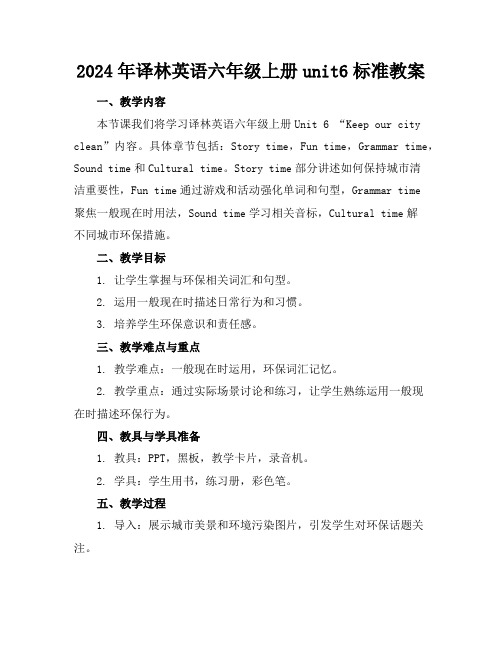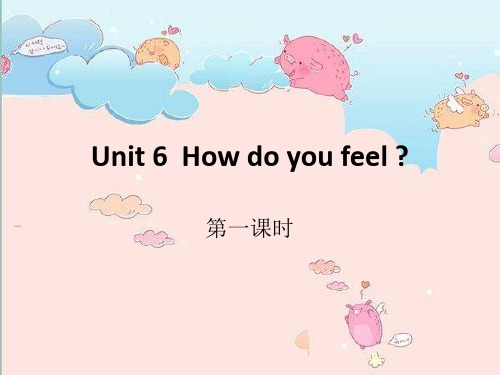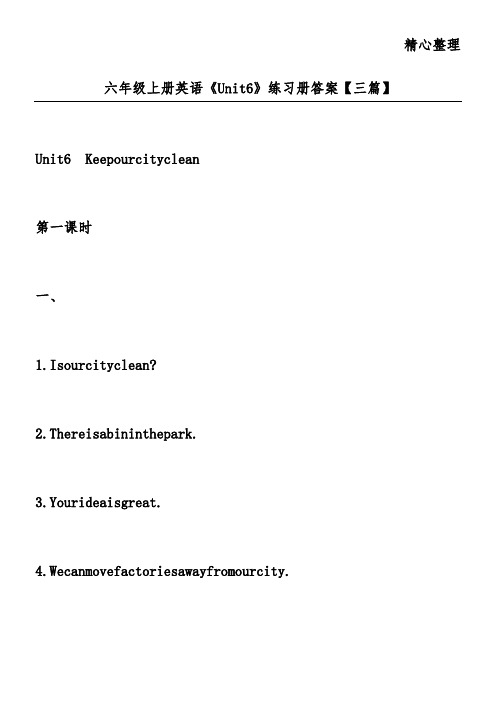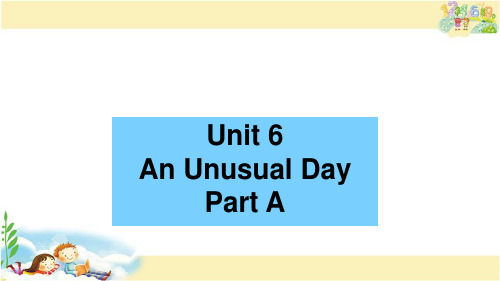六年级英语上册Unit6
2024年译林英语六年级上册unit6标准教案

2024年译林英语六年级上册unit6标准教案一、教学内容本节课我们将学习译林英语六年级上册Unit 6 “Keep our city clean”内容。
具体章节包括:Story time,Fun time,Grammar time,Sound time和Cultural time。
Story time部分讲述如何保持城市清洁重要性,Fun time通过游戏和活动强化单词和句型,Grammar time聚焦一般现在时用法,Sound time学习相关音标,Cultural time解不同城市环保措施。
二、教学目标1. 让学生掌握与环保相关词汇和句型。
2. 运用一般现在时描述日常行为和习惯。
3. 培养学生环保意识和责任感。
三、教学难点与重点1. 教学难点:一般现在时运用,环保词汇记忆。
2. 教学重点:通过实际场景讨论和练习,让学生熟练运用一般现在时描述环保行为。
四、教具与学具准备1. 教具:PPT,黑板,教学卡片,录音机。
2. 学具:学生用书,练习册,彩色笔。
五、教学过程1. 导入:展示城市美景和环境污染图片,引发学生对环保话题关注。
2. 新课内容呈现:通过Story time,让学生解保持城市清洁重要性。
结合Fun time,以游戏形式学习环保词汇和句型。
3. 例题讲解:讲解Grammar time中一般现在时,结合实际例子进行讲解。
4. 随堂练习:让学生运用一般现在时,描述自己在生活中为环保所做事情。
5. 小组讨论:分组讨论如何保持城市清洁,每组提出至少三条建议。
六、板书设计1. Keep our city clean2. 主要词汇:rubbish, bin, recycle, save, water, electricity3. 句型: What can we do to keep our city clean? We can4. 一般现在时结构:主语 + 动词原形七、作业设计1. 作业题目:(1)根据板书,用一般现在时描述你为环保做事情。
小学6年级英语上册Unit6 PartA let talk课件

of: (表示时间)在…的, 在…之前; 在…期间 (表示方式)根据 (表示对象)对于, 就…而言 (表示原因)由于, 因为 (表示方位)在; 位于 (表示范围)在…之中 (表示结果)在…方面 (表示目的)用于…的 (表示否定)缺乏, 没有
例如:
(表示态度)跟(…对抗)
The cat is angry with them.猫跟他们生气
Mum,if I feel angry,what should I do?妈妈,如果我 感到愤怒,我应该做什么?
After that…..? 然后 …..?
WWeelll,lf,ifrirsst,tt,atakkeeaaddeeeepp
bbrreeaathth.T.Thheennyyoouusshhoouuldldcount tocotuent.嗯to,te首n.先嗯,做首一先个,深做呼一 吸个。深然呼后吸你。要然数后到你十要。数到十。
家庭作业(Homework) 1.听录音,跟读对话. 2.完成活动手册配套练习
Unit 6 How do you feel?
第三课时
B.Let’s learn B.Play card games
能听、说、认读单词
T: I think I’m ill. T:.What should I do?
莎拉很生气
这猫害怕。
猫病了 莎拉很难过
莎拉和猫都很担心
他们都很快乐的。
同学们你们做对了吗?
一、选择题。 ( )1. I feel ill.I should this morning.
A. eat some fruit B. go to school C .see the doctor
( )2. Tf
C. with
六年级英语上册(牛津上海版) Unit6 going to school 知识点总结

沪教(一起)6A Unit 6 Going to school 知识点总结1.traveling time to school 去学校行走时间2.it takes sb. some time to do sth. 某人花一段时间做某事3.It takes him about ten minutes. 他花大约十分钟。
4.half an hour 半小时5.go to sp. by ferry 乘渡船去某地6.go to school on foot=walk to school 步行去学校7.how long 多久8.get to sp. 到达某地9.get to the supermarket 到达超市10.g et there/here/home 到达那儿/这儿/家里11.a restaurant 一个饭店12.a hotel 一个旅馆13.a n advertisement board 一块广告牌14.a few + c.n. 几个;一些(后跟可数名词复数)15.a lot of + c.n. & u.n. 许多(后跟可数名词复数或不可数名词)16.o n one’s way to school 在某人去某地的路上17.o n my way to school 在我去学校的路上18.b y light rail 乘轻轨19.d epartment stores 百货商店20.g o to kindergarten 上幼儿园语言点1. near 离…很近后面直接接地点I live near school.=My home is near school.我家离学校很近。
2. far away from=far from离…很远He lives far away from school.=His home is far from school.他家离学校很远3.by bus/bike/car/underground/train/ferry动词短语:take a bus/bike/car/underground/train/ferry ride a bikeHe goes to school by bus.=He takes a bus to school.4. on foot 动词:walkShe goes to work on foot every day.=She walks to work every day.5. It takes sb. some time to do sth. 花费某人多少时间做某事。
人教PEP六年级英语上册unit 6 单元教学课件

和你的朋友演一演
7
帮助
Unit 6 How do you feel ?
第四课时
If you are happy, clap your hands
Let’s learn
Who can help me?
I’m ill. What should I do?
You should see a doctor.
Unit 6 How do you feel ?
第一课时
Do you like popcorn ?
When do you eat popcorn?
Tom is chasing the mouse all the time. Is the mouse afraid of him?
How do you feel now ?
The cat is _____ with them. Sam: Maybe our cat is _________ a mouse now!
Look at the pictures and talk about your feelings.
How do I feel?
Names I My friend
B
Mum:萨拉,山姆,请来这儿
Sarah:怎么了?
Mum:你爸爸生病了。他上
午应该去看病,因此我们今
天不能去动物园了。
Sam:哦,不。
Mum:不要难过。我们可以
下次去!
Sam:爸爸现在感觉怎么样?
Mum:不是很好。我们一起
去医院吧!
• 1 What's wrong with their father? • 2 What should their father do? • 3 How does Sam feel? • 4 What should Sam do?
六年级上册英语《Unit 6》练习册答案【三篇】

精心整理 1.messy,dirty,keep,sweep,clean 2.from,makes,keep,clean,move,from,city 第三课时 一、 1.Canyoukeepourcityclean? 2.Whatdotheymean? 3.Pleasesweepthefloorandcleanthedesks. 4.WhatisBobbydoing?
精心整理 3.Wecanmovesomefactoriesawayfromourcity. 4.Rubbishmakesthestreetsmessyanddirty./Rubbishmakesthestree tsdirtyandmessy. 六、 1.Istheriverdirty?Yes,itis. 2.Whatmakesyourcitydirty? 3.Whatcanyoudo? 4.Wecan’tputrubbishhere. 第二课时 一、
MissLi:Whatmakesourcitydirty?
SuHai:Smokefromcarsandfactoriesmakestheairdirty.
LiuTao:Rubbishmakesthestreetmessyanddirty.
MissLi:Wecandomanythingstokeepourcityclean.
精心整理 5.Smokefromcarsmakestheairdirty. 六、 1.F 2.F 3.T 4.F 5.T
精心整理 (1.A 2.B 3.B 4.B 5.B) 三、 1.keep 2.Smoke 3.messy 4.rubbish 5.clean 四、 1.of 2.from 3.in 4.for 5.to 五、 1.Wecanwalktoschool. 2.Whatcanwedotokeepourcityclean?
闽教版英语六年级上册 Unit 6 An Unusual Day

动词原形及其过去式
一般现在时 get up /gets up walk to school /walks to school take a taxi /takes a taxi get to school / gets to school
动词变一化般对过比去式 got up
walked to school
• I get to school at _________.
• She gets to school at ________.
at (在…点钟)
half(半,一半)
• half past six 六点半 • half past nine 九点半 • half past twelve 十二点半
How about Wan Tao's unusual day?
动词的不规则变化
is—__w_a_s__ am— _w_a_s__ are—_w_e_re___
go—_w_e_n_t_
buy—_b_o_u_g_h_t
take—_t_o_o_k__ swim—_s_w_a_m___
make—_m__a_d_e_ say—___sa_i_d__
get— _g_o_t____
hour
动词原形 动词第三人称单数 过去时
get go do take
gets goes does takes
got went did took
I say you act
• get up • have breakfast • go to school • get to school • walk to school
• How does he usually go to school?
闽教版小学英语六年级上册Unit 6 单元知识梳理
闽教版小学英语六年级上册单元知识梳理Unit 6 An Unusually Day单词:usually [ˈjuːʒuəli] 通常地half [hɑːf] 半;一半past [pɑːst] 晚于;迟于hour [ˈaʊə(r)] 小时walk [wɔːk] 步行get to school 到达学校seat [siːt] 座位last [lɑːst] 上一个;刚过去的last night 昨晚little [ˈlɪtl] 小的fan [fæn 迷;爱好者本单元语音学习内容为降调。
英语朗读时语调来自于音调的变化,以降调和升调为两种基本语调。
降调一般用于陈述、命令,表“完整、肯定”的含义;升调用于提问等,表达“不肯定、礼貌、委婉”的含义。
能使用降调的句子有:陈述句,特殊疑问句,带有命令口吻的祈使句,感叹句等。
以本课第44页的句子为例:Put them in the washing ↓machine.(陈述句用降调)He usually gets up at half past ↓six.(陈述句用降调)Where are the pandas ↓from?(特殊疑问句用降调)How can I get to the train ↓station?(特殊疑问句用降调)Part A◆语言技能目标1. 能运用频度副词usually讲述日常行为和习惯。
2. 能用所学语言描述过去发生的事情。
课文学习Wang Tao usually gets up at half past six. But this morning he got up at half past seven. It was an hour late. 王涛通常在6:30起床,但是今天早上他7:30起床。
迟了一个小时。
⑴half是“一半”的意思,half past six就是“六点半”的意思,相当于学过的six thirty。
⑵this morning是“今天早上”的意思,类似的表达法有:this afternoon (今天下午),this evening (今天傍晚)。
人教新版 英语六年级上册 第六单元中文翻译
人教新版英语六年级上册Unit SixWinter is the white season. 冬季是一个白色的季节。
Lesson 31There are four seasons in a year. Spring is the first season. In China springtime begins around March.It is still a little cold, but it gets warmer and warmer. And the days get longer and longer.Spring is the green season. The trees have new green leaves. There are lots of new flowers on the cherry trees, apple trees, pear trees and peach trees. The animals come out from their long sleep. The birds sing to welcome the spring.What are they doing? They are looking at the flowers.What are they doing? They are farming the land.一年有四季。
春季是第一个季节,在中国,春天大约是从三月份开始。
天气仍然有点儿冷,但是会越来越暖和,并且白天也会越来越长。
春天是个绿色的季节。
小树们都长出新的绿叶。
樱桃树、苹果树、梨树和桃树上都开了许多新花。
小动物们从漫长的冬眠中醒来。
小鸟们唱着歌迎接春天的到来。
他们正在做什么?他们正在赏花。
他们正在做什么?他们正在耕地。
Lesson 32Spring is the first season. 春季是第一个季节。
Are they planting seeds? Yes, they are. No, they aren’t.他们在播种吗?是的,他们在播种。
六年级英语上册素材-Unit6 I am ill today课文翻译 湘鲁版
Unit6 I am ill today第六单元我今天生病了Section AA部分1. Look, listen and act看、听并表演Li Xiao is ill today.李晓今天生病了。
He has a fever.他发烧了。
He has a headache, too.他还头痛。
He is calling his teacher, Ms Li.他正在给他的老师李女士打电话。
Hello, may I speak to Ms Li, please?你好,请问我可以跟李老师通话吗?Hello, Ms Li speaking.你好,我就是李老师。
This is Li Xiao. I'm sorry, Ms Li.我是李晓。
很抱歉。
李老师。
I can't go to school today.我今天不能去上学了。
Why?为什么呢?I'm ill today. I have a fever.我今天生病了。
我发烧了。
I have a cough, too.我还咳嗽。
I'm sorry to hear that.听到这消息我很难过,Do you have a headache?你头痛吗?Yes, I do.是的。
Oh dear, you are very ill.哦,亲爱的,你病得很严重。
Please stay home and rest.请待在家里休息吧。
Thank you. Goodbye, Ms Li. 谢谢你。
再见,李老师。
Goodbye and take care.再见,保重身体。
2. Listen and say听和说I'm ill.我生病了。
Do you have a headache?你头痛吗?Yes. I have a headache.是的。
我头痛。
ill 生病的fever 发烧speak 说话cough 咳嗽headache 头痛hear 听到3. Listen, tick and match听录音,勾出正确答案,并搭配What’s the matter with the kids?孩子们怎么了?Zhou Lin, are you doing your homework? 周林,你在做作业吗?No, Mom. I can’t study. I’m ill.不,妈妈。
六年级上册英语课件-Unit6 (Lesson36) 人教精通版 (共29张PPT)
√eateaict iece-ccrreeaamm √plaplnantt ttrreeeses m√akeriadesanbiokewman
√goswsimwinimthemseiang √flflyy kkitietses
go camping
go on spring outings √gioce-sskkaateting √ phicavke apipcnpiclses
√goswsimwinimthemseiang √flflyy kkitietses
go camping
go on spring outings √gioce-sskkaateting √ phicavke apipcnpiclses
sweep the snow
cut rice
p√laypilnay tinhtehessnnooww
What do people do in winter?
√eateaict iece-ccrreeaamm √plaplnantt ttrreeeses m√akeriadesanbiokewman
√goswsimwinimthemseiang √flflyy kkitietses
go camping
In winter, it’s__co_l_d__ and it often_s_n_o_w_s_.
Brain storm What do people do in the picture?
The farmers are busy harvesting.
pick oranges
pick cotton
go on spring outings √gioce-sskkaateting √ phicavke apipcnpiclses
- 1、下载文档前请自行甄别文档内容的完整性,平台不提供额外的编辑、内容补充、找答案等附加服务。
- 2、"仅部分预览"的文档,不可在线预览部分如存在完整性等问题,可反馈申请退款(可完整预览的文档不适用该条件!)。
- 3、如文档侵犯您的权益,请联系客服反馈,我们会尽快为您处理(人工客服工作时间:9:00-18:30)。
万圣节
go
Women's Day 妇女节
May Day “五一”劳动节
Children's Day 儿童节
Dragon Boat Festival
端午节
It's in September or October.
We usually
eat moon cakes, play
with lanterns
and watch the moon .
Mid-Autumn Festival 中秋节
Can you say the holidays?
When's Halloween?
It's in October.
What do people usually do at Halloween? People dress up in costumes and go to parties.
Unit 6 Holidays
HOLIDAYS
HOLIDAYS
HOLIDAYS
HOLIDAYS
HOLIDAYS
HOLIDAYS
HOLIDAYS
大家有疑问的,可以询问和交流
可以互相讨论下,但要小声点
9
HOLIDAYS
Christmas 圣诞节
New Year's Day
元旦
Go
Guess: What holiday
B:They go to parties.
back
The second lesson
What holiday?
/eI/
/I/
favourite
特别喜爱的
A:What's your favourite
holiday?
B:My favourite holiday is…
Easter 复活节
Halloween
relative 亲戚,亲属
/e/ ห้องสมุดไป่ตู้I/
Let's go to our dialogue.
bye
When's Christmas?
It's in December. It's on the twenty -fifth of December .
A:What do people usually do at Christmas?
B:They buy the Christmas trees
and give presents to each other.
A:When's New Year's Day?
B:It's in January. It's on the 1 st of January.
A:What do people usually do at New Year?
dress up in costumes 装扮
is it?
It's in January or February.
People usually eat lots of nice food with their family or friends.
delicious 美味的,可口的
Spring Festival 春节
People visit their relatives and friends, and eat lots of delicious food.
